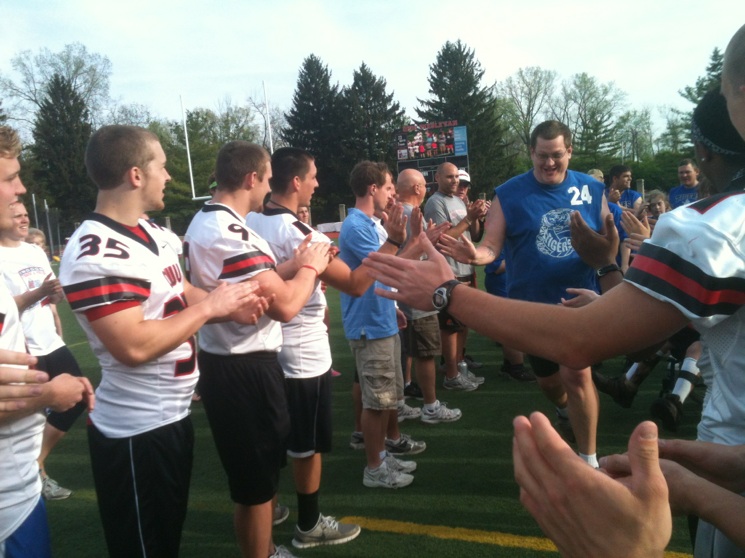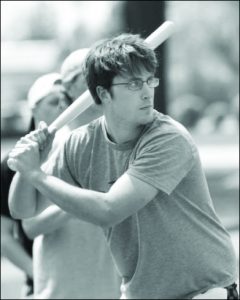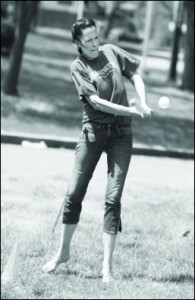Senior Nick Peranzi is defying national trends.
He and his girlfriend of nearly a year, senior Rachel King, plan to be married within the next few years.
“If you would have told me this would have happened three years ago,” said Peranzi. “I would have thought you were crazy.”
Peranzi lavaliered King, a practice carried out in the fraternity community in which a member presents his girlfriend with the letters of his fraternity, thus placing her on the same level as his fellow fraternity members and promising to marry her.
Peranzi, as a member and former president of Alpha Sigma Phi, said lavaliering is “not a throw away gesture.” He said he cares deeply for King.
“I’ve known for quite some time that she satisfies anything I’ve ever wanted and I love her,” he said.
Peranzi’s story, in accordance with national trends and research, is an outlier. Marriage rates, especially among young adults, have declined rapidly since the 1970s.
According to the 2011 Marital Status Survey by the U.S. Census Bureau, 49.3 percent of the population is married while 31.1 percent has never been married. These statistics, when broken down to examine age categories, would place Peranzi within a minority.
• Only 11.4 percent of the population between the ages of 20 and 24 was married in 2011. This statistic jumps to 62.2 percent of the population between the ages of 35 and 39 years.
• The statistic remains at around 50 percent of the population until Americans reach their mid 70s.
• In 2007, 14.7 percent of the population between the ages of 20 and 24 was married, as compared to 64.8 percent of the population between the ages of 35 and 39.
• These percentages jump sharply just 11 years previously. In 1998, 18.8 percent of the population between the ages of 20 and 24 was married.
• In 1994, 61 percent of the population was married, as compared to 72 percent in 1970.
Cohabitation, or the practice of living with a chosen life partner, is also on the rise while divorce rates, at 50 percent, have leveled off somewhat in the last decade.
While these statistics encourage some to shy away from marriage, Theodore Cohen, professor of sociology at Ohio Wesleyan University, is convinced attitudes toward marriage have stayed largely positive among college students, namely women.
Many of the students who take Cohen’s upper-level sociology class, the family, feel as though they would one day like to tie the knot, although probably not for quite some time.
This thought process stands true of much of the Ohio Wesleyan University student body, and of some other college students across Ohio.
Issues such as religion, sexual relations, economic stability and gender, however, largely dictate opinions and goals among students on the concept of marriage, and marriage at a younger age.
Sex
Peranzi says he and King are “absurdly compatible.” He doesn’t mind not being a part of the so-called “hook up culture” at OWU, although he said he does not look down on those who choose to spend their college years sleeping with as many people as possible.
“No question, there’s a huge number of people who think college is for having all the hook up fun you can. I don’t really feel that my status as being in a long-term committed relationship makes me feel negatively towards (these people), but it makes me not want to identify with that culture,” said Peranzi. “I would actually liken it to the drinking culture. I used to drink, but now I don’t much. Just because I choose not to partake, does not mean I judge other people for their decisions.”
A study obtained from Columbia University found perceptions of sexual activity among college students are actually higher than realities of sexual behavior.
While 80 percent of students polled at four American universities in 2002 reported to be sexually active, these students reported only having one or fewer sexual partners in the last year. Fifty-nine percent of these students reported not having any sexual partners in the last 30 days.
The study concluded perceptions of student sexual behaviors are far removed from reality. Only 22 percent of students polled were not surprised by the study’s findings.
Students do, however, value sexual experiences in their college years. Freshman Paige Pramic is dating one of her best friends. According to Pramic, the two did not intend to start dating.
“It just sort of happened,” she said.
Pramic does not feel the need to have multiple sexual partners at this time in her life, but unlike Peranzi, she finds the concept appealing.
“It would be pretty damn fun,” she said.
Sophomore Anthony Fisher said he agrees. He said he believes it may be healthy to have different types of sexual experiences.
“In a ‘non-manwhorish’ tone, I feel if you have a reasonable amount (of partners) that’s good (and) that means you’re ‘normal.’ By that, I mean you have an open mind,” said Fisher.
Senior Benjamin Andrews wishes to separate himself from the “hook up culture” at OWU. He proposed to his fiancé, Danielle Bonnert, ’11, in November.
The pair began dating their sophomore year with the intention of marrying someday.
“I know a lot of our generation is independent, but in my mind, I feel as though two is so much better than one,” said Andrews.
Bonnert and Andrews will marry in one month.Andrews wanted to be clear of his intentions with Bonnert.
Although he, like Peranzi, does not look down upon those students who choose to sleep with multiple people throughout their college years, he doesn’t agree with these students’ values.
“I think it’s silly when you talk about the college culture. A lot of people come out of high school directionless and come to college to party and take classes on the side,” said Andrews. “This is destructive (and leads to) terrible choices.”
Andrews and Bonnert chose to remove themselves from the college culture and focus upon their relationship and studies.
“People deserve to be respected and when you hook up with someone and the next morning don’t know (their) name, that’s wrong somehow,” said Bonnart. “Girls don’t need their hearts trampled on.”
Diana Muzina, a high school junior at Notre Dame Cathedral Latin School in Chardon, Ohio, said she sees part of the “hook-up culture” in her high school. She has never been on a date and never been in a relationship.
“So far, I have been disappointed by guys,” she said. “I’ve been toyed with and led on.”
These experiences have encouraged her to never sleep with “just anyone.”
“I’m not going to throw myself around,” said Muzina. “And, above all, I would have to have been in a long-time relationship to ever decide to (have sex).”
Muzina said she is afraid, however, that her values will never match up with a man she is interested in.
“As of now, never being in a relationship before, I feel as if I am sort of missing out on something,” said Muzina. “I wonder what I am doing wrong. But, it will happen eventually, at least that’s what everyone’s telling me.”
Religion
Peranzi said he sees the values he was raised with as a member of the United Church of Christ as a factor in his decision to marry.
Although he no longer identifies with organized religion, he said he sees his past in a stable faith tradition as part of his life and values today.
“I think that the values I was taught through the church helped to shape my current life values and my (desire to have) a stable family,” he said.
Peranzi thinks those without a stable faith background may have a higher tendency to engage in “more animalistic priorities.”
Thus, those college students may wish to not stay faithful to one individual, but sleep with as many as possible and not concern themselves at all with the possibilities of marriage.
Angie Hall, a junior at Bowling Green State University, said she feels sleeping with any person outside of marriage is “morally wrong.”
Yet, she said she still wishes to search for the person she will marry in college. Hall is a member of the Catholic Church.
“In college, you have the chance to constantly meet new people and any of these might be ‘the one,’” she said.
“I also feel like college allows you to see your potential spouse in a variety of different social settings, which helps in the evaluation process of whether he is potential marriage material or not.”
Hall said she would ensure the man she wishes to marry would attend premarital classes, practice natural family planning and engage in pragmatic evaluation of expenses and timing for having children.
“I think the purpose of dating is to find a future spouse,” said Hall. “I would never date anyone who I would not consider as the future father of my children.”
Andrews said he agrees.
He attributes much of his ideology on relationships to the Christian tradition.
“I’ve been a Christian for 10 years now,” said Andrews. “I grew up in a family that loves Jesus a lot.”
Andrews views marriage as a symbolic representation of the relationship Jesus has with humanity. His fiancé does as well.
He said he believes marriage to be sacred and thus has not engaged in any sexual activity with his future spouse.
The couple chose to not live together because, if they did, Andrews fears the temptation to sleep together would be too great.
Andrews does not agree with the life decisions of his peers but does not set himself apart from them either.
“I don’t agree with people’s decisions, but I can’t expect anyone to act the way I think they should act,” he said. “While I believe their actions are morally destructive, I am flawed. I am no better than they are.”
Economics
Robert Gitter, professor of economics at Ohio Wesleyan University, attributes decreasing marriage rates to trends in women’s empowerment in the workplace.
He cited the Equal Pay Act of 1963 as a means through which women are more motivated to work for their career success. This, in his opinion, has greatly changed marriage.
By waiting to marry, or perhaps even never marrying, women may find a greater reward in their careers, lifestyle and economic stability, according to Gitter.
Gitter said women now have higher rates of education and are thus able to maintain more high-income jobs in such fields as medicine and law.
As a result, Gitter said women on average in the United States now give birth to 2.1 children in their lifetimes, as opposed to 3.7 children, which was the average in 1960.
Women, and men, may be scared to have children or start a family due to economic instability and, thus, may refrain from marriage or may choose to marry a spouse who does not wish to have any children.
Senior Blair Connelly said she doesn’t think having children would be a “constricting factor” upon marriage but she personally does not wish to have any children.
She “would make sure before marrying that her partner did not want children either.”
Senior Anthony Harper said he places his economic stability before his decision to have children.
He said economic stability in the present and the future would be an important factor in any decision he might make to get married.
“Creating a family will limit my economic future,” he said. “At first, the idea of having children doesn’t seem that bad, but when you conduct research and find that you will spend one million on a kid until the age of 18, it doesn’t come across as appealing.”
Harper said he feels having children would limit his goals and the goals of his spouse.
“Economic stability is even more important with children,” he said. “Children are chains that limit a lot of possibilities economically and career-wise.”
According to national trends, women are not waiting for marriage to have children, but are instead waiting for a convenient time in their career. Since the 1980s, single parent families have been the most rapidly expanding family type in the United States. 12 percent of families were one parent in 1970 as opposed to 18 percent in 1980.
These trends question whether the concept of marriage itself is an institution in decline.
Women
Cohen doesn’t think so. According to him, college-educated women are the “one demographic in the United States that is most likely to get married.” In fact, marriage rates among college educated individuals are actually increasing.
“Those with college educations have increased marriage rates,” said Cohen. “But among those with less education, marriage rates have actually taken a downturn.”
This could be attributed, according to Cohen, to increases in couples living together outside of marriage, which has led to more children born out of wedlock and, eventually perhaps, into one parent homes.
Among college women in their 20s, in fact, the majority of births are actually outside of marriage.
Since the mid-1980s, Cohen asserts it has been “less taken for granted that people will get married. For women specifically, there’s a sense of how complicated (marriage) will be.”
Cohen has seen more students openly talk about living together first. There are seven million unmarried couples in America.
A large amount of these couples will get married, although living together may change their plans.
Twenty-year-old Dana Linden dropped out of Roanoke College after her freshman year. She now lives with her boyfriend of nearly two years, Bryan Koncar, in a condo in Brunswick, Ohio. She would like to marry within the next five years, but is happy with her current living situation.
“I personally think marriage is beautiful, from the ceremony to the fact that you’re so in love with someone that you commit to spending the rest of your life with them,” said Linden.
She said when she pictures her future, Koncar is a part of it.
“I didn’t intend at all to start dating him, but stuff happens,” she said. “We’ve talked about marriage casually (but) only time will tell and I need at least another year of dating to find out for sure, but I’d like for him to be the one.”
This dating, in Linden’s situation, involves living and working together with Koncar to create a lifestyle that allows for each of them to create their dreams.
Factors such as children and socio-economic status, according to Cohen, greatly affect the success a couple may have.
Policies and legislation in America make it hard for women to have children and return to work at a time that is more convenient for their family.
Most American employers allow limited time for maternity leave, as compared to employers in European countries.
“Kids require a different lifestyle,” Cohen said. “This society makes it hard to both work and support a family.”
This may place stress upon a relationship. According to Cohen, American society creates a gap between men and women in a relationship.
“Who is going to stay home becomes a women’s issue when it should be a people’s issue,” said Cohen.
Peranzi said he believes any issue may be overcome through the love he and King have for each other. They see marriage as the ultimate, beneficial relationship.
“It is difficult to be successful in aspects of life without marriage,” he said. “In addition to the obvious emotional benefits of marriage, a life mate provides someone with whom you can frankly discuss topics you might not be able to in another setting. A life mate provides the stability needed in your personal life for a successful professional life.”
He and King wish to have a family and home of their own and they wish to travel a great deal, together.
They are excited for the future ahead of them, not worried about the possible implications national trends may have upon their future.
Peranzi said he places the benefits of love and having a family above worries. To him, these things are much more important.



